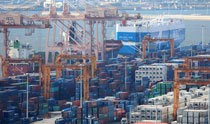Korea posts trading deficit for seven consecutive months
Korea posts trading deficit for seven consecutive months
Posted November. 02, 2022 08:02,
Updated November. 02, 2022 08:02

Korea's exports figure turned negative in two years due to the economic recession triggered by global monetary tightening. Exports for key products such as semiconductors, shipping, steel, and petrochemicals have all declined, resulting in a trading deficit for seven consecutive months. The trading deficit for the months between January and October recorded 35.6 billion U.S. dollars, the largest in the annual accumulative figure, while the trade with China, Korea's largest trading partner, posted the biggest loss in history. Korea's export-driven economy faces many risky signals amid expectations of a global economic downturn next year.
According to the October trade trend report by the Ministry of Trade, Industry, and Energy released on Tuesday, the export volume for October was 52.48 billion dollars, a decrease of 5.7% year-on-year. The first negative figure for monthly exports since October 2020 fell by 3.9% year-on-year. The monthly exports figure continued to rise for 23 months until September 2022. The imports for October increased by 9.9% year-on-year to 59.18 billion dollars. As a result, the trading deficit recorded 6.7 billion dollars, a negative trading figure for seven consecutive months in 25 years since May 1997.
As for respective industries' figures, semiconductor exports dropped by 17.4% compared to 2021, a three-month-consecutive decrease due to declining product prices amid a global economic slowdown. Products in petrochemicals, steel, and computers all posted a huge loss of two-digit percentages by 25.5%, 20.8%, and 37.1%, respectively. Trade with China, a long-standing source of the trading surplus, fell by 15.7%, a five-month-consecutive decline. On the other hand, energy imports for October rose sharply by 42.1% year on year to 15.53 billion dollars, contributing to a large trading deficit.
Trade, Industry, and Energy Minister Lee Chang-yang said it would not be easy to reverse the declining trading trend in a short period as downward risks of the global economy, including high inflation, are getting more apparent, and many key economic institutes are mentioning possibilities of economic recession in 2023. He added that the Korean government is taking the current economic signals very seriously, including the declining exports in October.







